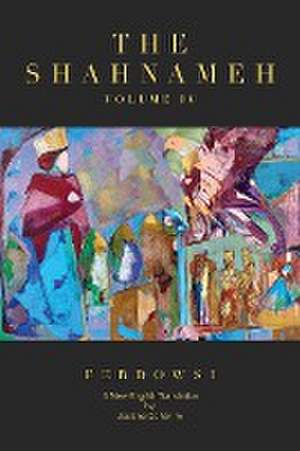The Shahnameh Volume IV
Autor Hakim Abul-Ghassem Ferdowsi, Josiane Cohanimen Limba Engleză Paperback – 16 sep 2023
Preț: 204.16 lei
Nou
Puncte Express: 306
Preț estimativ în valută:
39.06€ • 40.79$ • 32.26£
39.06€ • 40.79$ • 32.26£
Carte disponibilă
Livrare economică 25 martie-08 aprilie
Preluare comenzi: 021 569.72.76
Specificații
ISBN-13: 9781734966169
ISBN-10: 1734966165
Pagini: 750
Dimensiuni: 152 x 229 x 44 mm
Greutate: 1.08 kg
Editura: Girouette Books
ISBN-10: 1734966165
Pagini: 750
Dimensiuni: 152 x 229 x 44 mm
Greutate: 1.08 kg
Editura: Girouette Books
Notă biografică
The Iranian poet Ferdowsi (940-1020) was born into a family of landowners near the city of Tous, in northwestern Iran. His epic poem, The Shahnameh, is one of the most important works of Persian literature. It is a collection of myths, legends, and history that begins with the story of creation, covers the various Persian dynasties, and ends with the Arab conquest of Iran. With the death of King Yazdegerd, the last Sassanian king, the caliphate "brings a new religion and replaces the throne with the pulpit." Ferdowsi spent thirty years composing The Shahnameh. One of his incentives was clearly the preservation of the past: Iran's myths, history, and language. He gathered centuries-old myths and legends handed down through oral and written traditions. There were early prose writings and, most notably, one thousand verses written by the poet Daghighi. Ferdowsi adapted Daghighi's lines into his 50,000 well-crafted and lyrical couplets. In the end, he handed his final manuscript to Sultan Mahmud of Ghazni (999-1030), who is said to have failed to pay him appropriately. In the process of recording ancient myths, Ferdowsi reveals an even greater incentive: the importance of the spoken and the written word and the precious value of words of wisdom. His poetic language is most effective in communicating the complexities of the human mystical journey in varying layers of depth through characters, battles, actions, and unfolding stories.
